Need healthy coping skills for dealing with uncomfortable feelings? Looking for ways to handle uncomfortable emotions?
We’ve all been there, minding our own business when an uncomfortable feeling makes it known to us and no we’re not talking about the taco you demolished in a minute or the soda you gulped down straight after.
No, we’re talking about the uncomfortable feelings and difficult emotions that can make grown adults squirm, it’s the feelings that can make you feel warm and fuzzy one minute and then completely icky the next, yes we’re talking about our emotions.
Just because you’re experiencing emotional pain, doesn’t mean you are not mentally strong. We all face uncomfortable feelings. Mental strength comes from facing your feelings and working through them.
Uncomfortable feelings can catch us out of the blue, perhaps triggered by something seen on social media, and can turn a great relaxing day into a more anxiety-filled experience. Luckily for us, we have control over these uncomfortable feelings; they do not need to control our days or our bodies. Let’s take a look at how we can manage these uncomfortable feelings and the mental pain they can cause us.

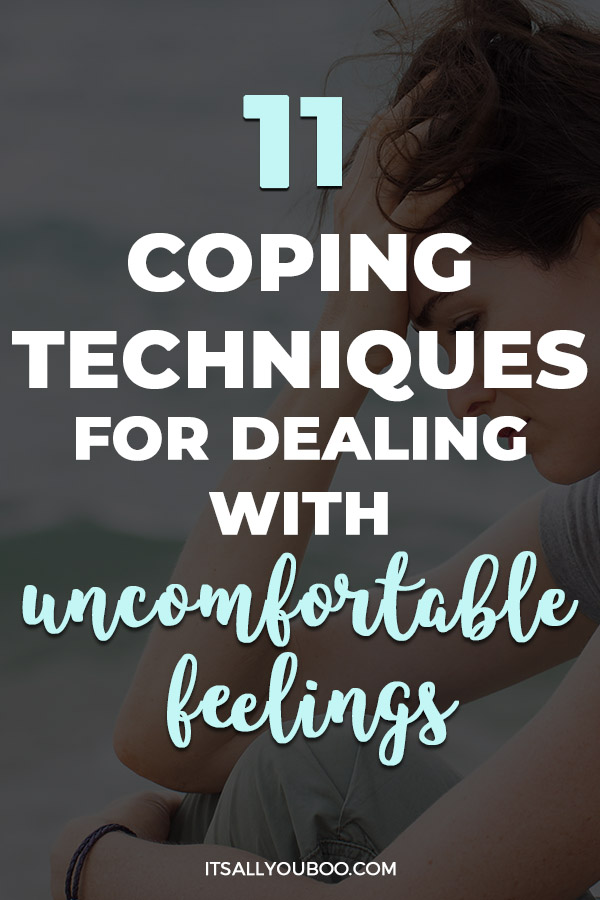
THIS POST MAY CONTAIN AFFILIATE LINKS.
IF YOU MAKE A PURCHASE FROM THESE LINKS, I MAY EARN A SMALL COMMISSION.
CLICK HERE FOR MY FULL DISCLAIMER STATEMENT.
Uncomfortable Feelings List
What do uncomfortable feelings, feel like? Uncomfortable feelings are the umbrella term for feelings that we are not familiar with and include:
- Anxiety
- Depression
- Embarrassment
- Sadness
- Anger
- Shame
- Guilt
- Loneliness
Feeling uncomfortable not only occurs when we are by ourselves but we can also be feeling uncomfortable with someone and feeling uncomfortable in a relationship.
No matter how they appear, it’s safe to say that these feelings have the potential to turn a day upside down.
Why Should I Deal with Them?
While pushing these feelings under the rug may seem like the best option, avoiding your emotions can lead to unhealthy coping mechanisms as well as health implications.
Preventing our emotions from surfacing can cause physical stress on our body and can affect our blood pressure, memory, and self-esteem.
On a long-term basis, suppressing our emotions has been shown to increase the chances of premature death by 30%, cancer by 70% as well as diabetes and heart disease.
On top of this suppressing emotions can lead to further uncomfortable feelings such as anger, anxiety, and depression. Let’s talk about how to start dealing with uncomfortable feelings before they lead here.
👉🏽 RELATED POST: How to Improve Emotional Wellness
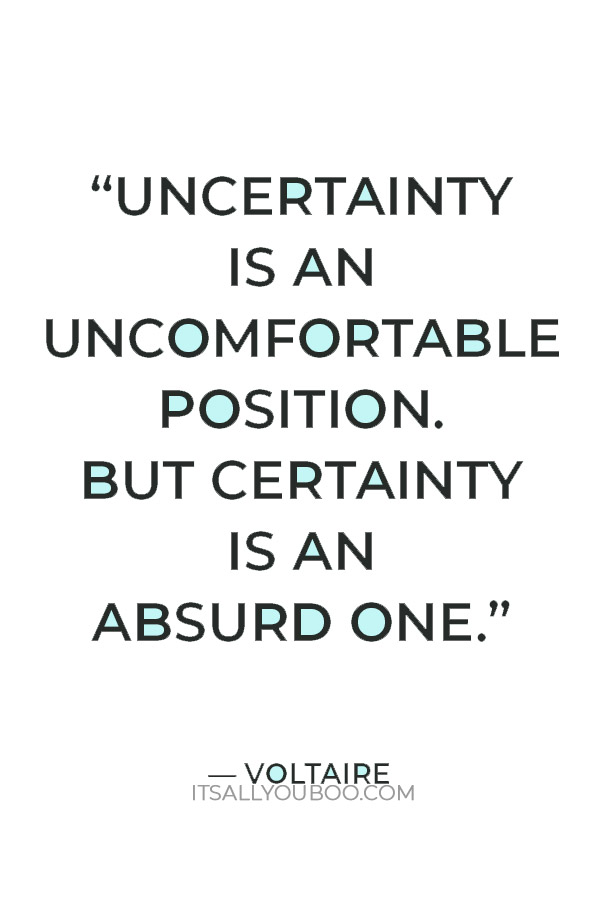
How To Start Dealing With Uncomfortable Feelings
Coping Technique #1: Acknowledge the Feeling
This one may seem obvious but when an uncomfortable feeling arises acknowledge it, instead of avoiding it. If you aren’t sure what emotion you’re feeling, talking it out with a friend, a family member, in therapy with a healthcare professional, or journaling can help you identify the emotion and may help you recognize if there are one or more emotions you are sitting with.
Acknowledging the emotion can be said out loud or in your head to yourself, it could be a simple ‘I am feeling angry or I am feeling embarrassed’. Once acknowledged, we can start taking steps to accept the emotion within ourselves.
Uncomfortable feelings have been given a bad rep and a lot of us may think of these feelings as bad. When we label something as bad, our bodies can reject the feeling and push it under the rug. This can result in bottling up our feelings and all the health consequences that go with it.
Viewing a feeling objectively and not as bad, can help us to accept this feeling rather than reject it. Once we accept the feeling, we can experience the feeling without judgment or wanting to change it and this can help us regulate our emotions better and can improve our emotional balance.
👉🏽 RELATED POST: How to be Comfortable with Yourself

Coping Technique #2: Breathe
Uncomfortable feelings can make us feel horrible. And when we don’t feel great our breathing naturally changes from deep relaxed breaths to either rapid breathing. Or you may find that you start holding your breath for longer periods of time which can exacerbate that uncomfortable feeling.
By being mindful of our breathing, we can start to regulate our breath and relax our bodies. It can help our bodies process any uncomfortable feelings we may be feeling at the time.
Deep slow breathing also helps to increase the amount of oxygen in our bodies and reduce the build-up of carbon dioxide that typically happens when we hyperventilate.
How Breathing Helps You Manage Emotions
Deep breathing, as well as breathing exercises such as box breathing or single-nostril breathing, can help. Breathing deeply or specific breathing exercises can help to stimulate the release of neurotransmitters in our brain. These neurotransmitters are our happy hormones and include dopamine and serotonin.
Dopamine is one of the reward neurotransmitters, it’s released as a reward and is a feel-good hormone. Not only does it boost our mood and can take our attention away from uncomfortable feelings but dopamine also induces a calming effect and can increase our memory.
Deep breathing stimulates our diaphragm, when our diaphragm contracts, it sends a message to our brain to release dopamine.
👉🏽 RELATED POST: Mindfulness Activities to Stop Living in Crisis Mode
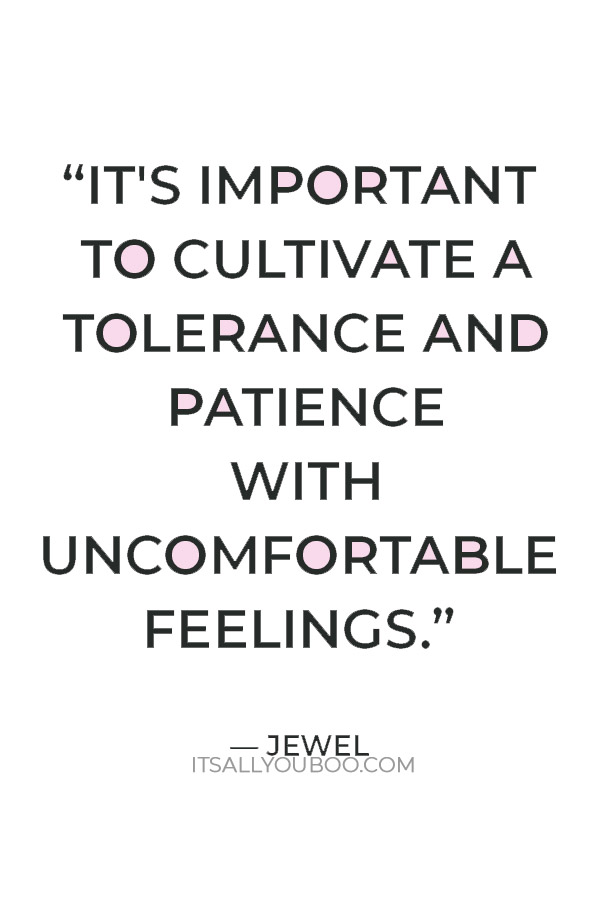
Specific breathing exercises help to stimulate the diaphragm and also work as a reward system. These exercises include box breathing and work by holding your breath for a particular time period.
When you release your breath from holding it, your body rewards you with a dose of dopamine. Thus breathing deeply or doing specific exercises can help boost our moods and relax us. That’s why it’s one of the best mental health tips for dealing with uncomfortable feelings.
Coping Technique #3: Meditate
Meditation in simple terms is a form of mindfulness and helps to focus our minds on the present. Whilst we may think of meditation as sitting on a cushion in a state of Zen, meditation is actually a generalized term that encompasses many different types of meditation. These include guided meditation, mantra meditation, yoga, and Tai Chi.
Meditation helps to induce a deep state of relaxation within your body. It opens up a space for our bodies to process the activities and feelings of the day.
As we process these events or feelings, our heart rate and blood pressure reduce, improving our health and wellbeing. Meditation can also help us focus on the present and what’s currently happening rather than events or emotions that have happened in the past.
👉🏽 RELATED POST: Creating a Meditation Space
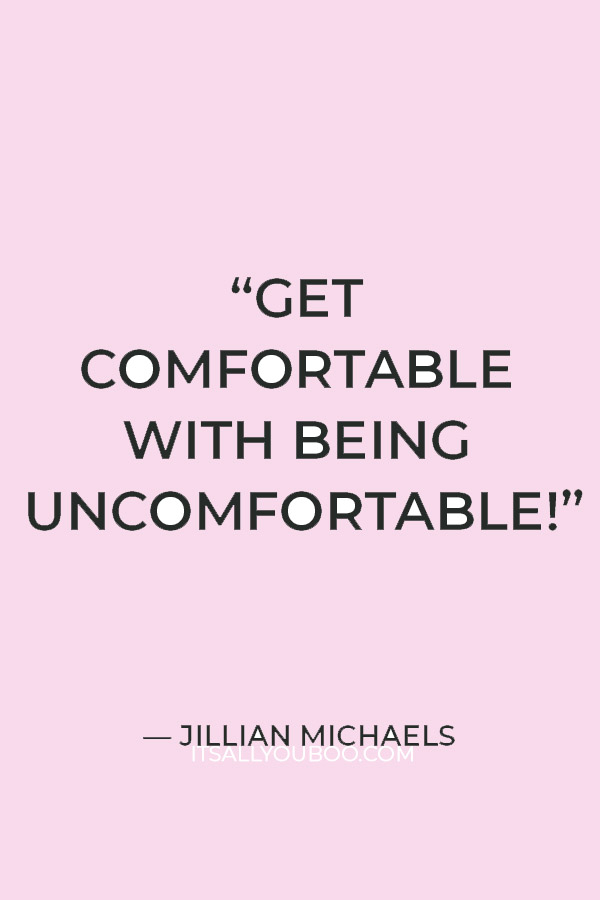
Coping Technique #4: Talk or Journal it Out
Uncomfortable feelings can leave us with a lot of that emotion in a short space of time and this can feel overwhelming. Talking it out with a friend or even to your dog or journaling can help release the emotion.
Talking or journaling helps to release any negative feelings and helps our body to process the feeling and any memories attached to them.
Journaling also helps to connect us to our subconscious thought patterns, by writing out all our feelings and events attached to our uncomfortable feelings, it can help us to identify limiting beliefs we may have.
If you are experiencing an uncomfortable feeling towards someone, addressing it by confronting the situation with the person involved can help subside these feelings. In certain situations, this may not be applicable and in these cases, journaling can help to release these feelings.
Coping Technique #5: Get Creative
Getting creative includes not only art but sewing, gardening, and even dancing. These simple activities are fun but also incredibly therapeutic for our minds. Choose a new hobby idea to release the creative juices.
Engaging in a creative activity can help shift our awareness from past events to the present. It activates the release of dopamine in our brain and can help our mind process any trauma and negative emotions.
Creative expression can also help us release our emotions in a healthy, safe, and artistic way of life. Next Friday evening, through on your favorite podcast and just get creative. Let you art and creations help you start dealing with your uncomfortable feelings.
Coping Technique #6: Practice Emotional Self-Care
Practicing emotional self-care is defined as becoming aware of your feelings and allowing yourself to channel the emotions in a way that benefits your overall health.
This form of care is not in the form of a spa day but rather in the form of setting boundaries with relationships and within the workspace. Make sure to have quiet time to journal or meditate and reflect on your feelings.
👉🏽 RELATED POST: Become Self Aware by Journaling

Emotional self-care can be difficult to practice especially with a busy schedule and is something easily forgotten about. To help us practice emotional self-care, it helps to make it a conscious decision, this can be done by scheduling our calendars or making a reminder on our phones.
This way we won’t be able to forget about it and by making it a conscious decision, after time it will become a subconscious habit.
Coping Technique #7: Identify What You Need
Often our emotions can be clues from our body telling us that it needs something, but we’re not giving it.
Feeling lonely could be a sign that we need to get out and socialize more, and anger could be a sign that we need to release our emotions through creativity or journaling.
Once we give ourselves what we need we may find the emotion reducing or disappearing completely.
What uncomfortable feelings and emotions is your body trying to tell you about?
Coping Technique #8: Positive Thinking
Negative feelings like bottling up our feelings can have consequences on our health. These consequences include depleting the neurotransmitters in our brain that are needed for emotional health, creating chronic stress, and reducing our immunity.
Whilst positive thinking may be thought of as forcing our bodies to feel positive during hard times, it can also mean transmuting our uncomfortable feelings into positive ones.
This can be done by internally reflecting on our feelings and why we feel that way. An example could be feeling sad or grief due to our love for someone or an activity that has been lost. Once we have figured out the reason for experiencing a certain feeling, we can focus on the positive side of it such as that we got to experience love for a person or activity.
Focusing on the positive side of the situation can help to reduce the state of stress we are in, improves our well-being, and increases our resistance to illnesses.
If our uncomfortable feelings are long term such as depression or anxiety, focusing on positive affirmations such as ‘today is going to be a great day can help us tune our attention to the positive things happening in the day instead of the negative.
👉🏽 RELATED POST: How to Stop Thinking Negatively About Yourself
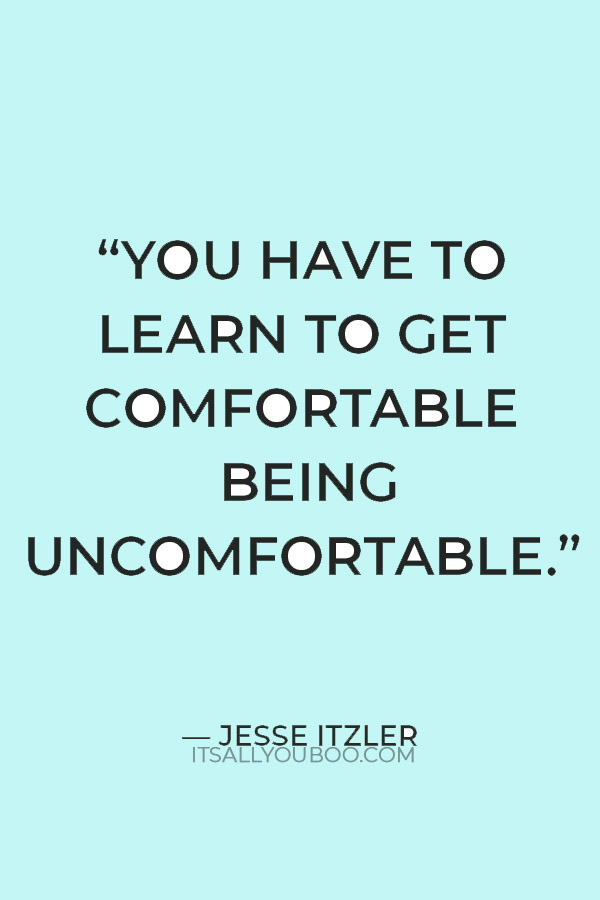
Coping Technique #9: Practice Gratitude
Gratitude is a state of thankfulness and is probably the last thing on your mind when you’re feeling angry or sad.
When we acknowledge the good things in our lives, it opens our minds to focus on the good instead of the bad. It can help increase our positive thoughts, increase our self-satisfaction, and can enhance our mood.
When we practice gratitude, our brain releases the neurotransmitters serotonin and dopamine, our happy hormones, and can help boost our mood.
Practicing gratitude can be a simple task or verbally acknowledging things we are thankful for in the day or writing out things we are thankful for. As your practice of gratitude increases, you may find that the list of things you are grateful for expands exponentially.
Coping Technique #10: Go See a Professional
Sometimes uncomfortable feelings can be overwhelming and difficult to process by ourselves, in this case seeing a professional can help to guide us in processing these feelings in healthy ways.
Therapists can help us to identify unfamiliar emotions and can help us to process the feelings in a safe space, they can also help give us tools or teach us skills to help process these emotions in the future.
In extreme cases, you should seek out professional medical advice, like online therapy, especially if dealing with uncomfortable feelings is a recurring struggle for you in your day to day.
Coping Technique #11: Supplements
This one is probably the last thing on anyone’s mind when you have an uncomfortable feeling but supplementation can help support our bodies during challenging times.
Our feelings can be a result of an event or our bodies telling us it needs something specific, however, it could also be a result of our bodies having a deficiency in a nutrient or neurotransmitter.
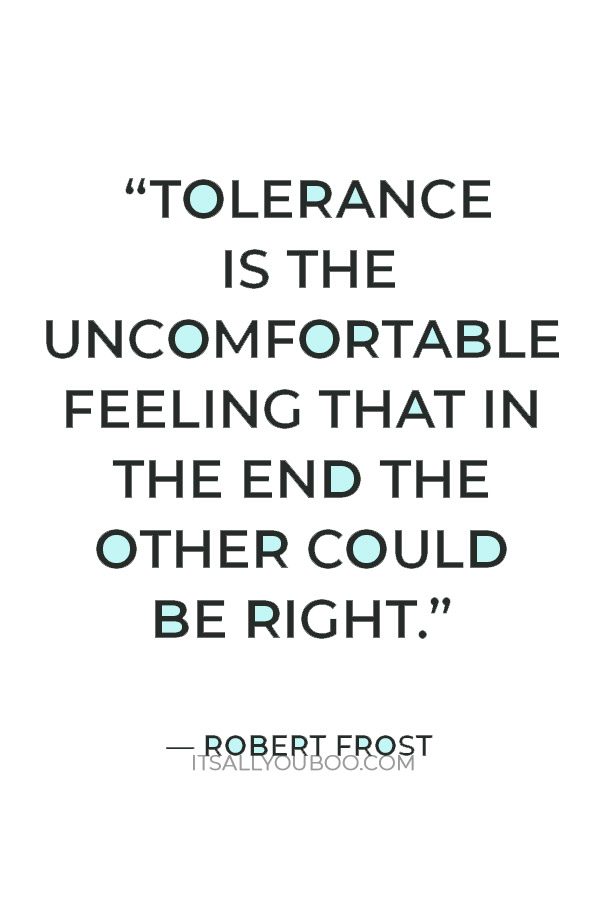
Deficiencies in the B vitamins, serotonin or dopamine have been found to increase the prevalence of anxiety, depression, and other related mood disorders. Supplementation and in some cases medication can help to replenish these levels and help reduce the feelings of depression and anxiety.
Vitamins such as the B vitamins, precursors to the neurotransmitter such as 5-HTP and GABA as well as nootropics for mood and anxiety can help to support our bodies and correct levels of neurotransmitters in our bodies.
There is a range of supplements and for the supplement newbie, this can be overwhelming, in this case, it may help to chat to a health professional to guide you in choosing the best supplement for you.
Dealing With Your Uncomfortable Emotions
Uncomfortable feelings happen and when they happen it doesn’t have to be a negative experience. It can be an invitation to learn a new skill, a reason to pause and reflect, and an opportunity to give our bodies what it needs.
It could be an opportunity to share what we’re experiencing internally with other people, whether friends, support groups, or professional mental health workers. You don’t have to work through this on your own.
Be More Positive Affirmations
Need to shift your mind through negative, uncomfortable feelings? Get your FREE 20 Printable Positive Affirmations to help you start thinking and living more positively today.
Either way, when these feelings come our way, rather than ignoring the feeling, embrace them, and let your body feel the emotion. You never know what lesson or blessing may come from it.
Throw away your concepts of what mentally strong people do or do not do. Instead, embrace your emotions so you can work through them. Only then can you be free of the “uncomfortableness.”
As Amy Morin, the author of 13 Things Mentally Strong People Don’t Do says, “Mentally strong people invest more energy into working on their weaknesses rather than trying to cover them up.“
Don’t be afraid to actually feel and feel through your uncomfortable emotions.

How are you dealing with uncomfortable feelings?

More About Guest Contributor
My name is Daniel Louwrens, and I have more than 10 years of experience in the bodybuilding & fitness world as a Certified Personal Trainer. I have graduated with a degree in Chemistry, and my aim with helping people is to educate people who have questions about anything and everything fitness: Training, Nutrition, Recovery, and PED’s.
Last Updated on February 14, 2025
